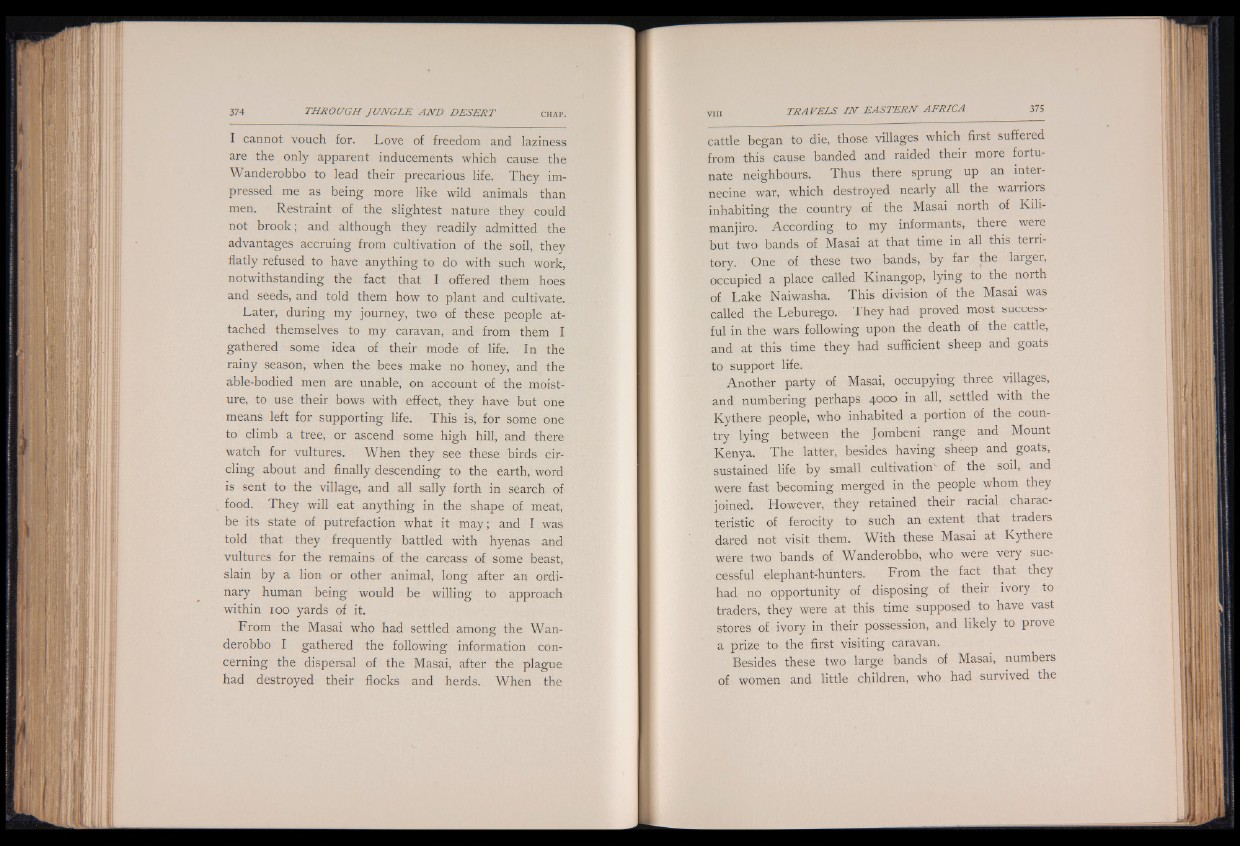
I cannot vouch for. Love of freedom and laziness
are the only apparent inducements which cause the
Wanderobbo to lead their precarious life. They impressed
me as being more like wild animals than
men. Restraint of the slightest nature they could
not brook; and although they readily admitted the
advantages accruing from cultivation of the soil, they
flatly refused to have anything to do with such work,
notwithstanding the fact that I offered them hoes
and seeds, and told them how to plant and cultivate.
Later, during my journey, two of these people attached
themselves to my caravan, and from them I
gathered some idea of their mode of life. In the
rainy season, when the bees make no honey, and the
able-bodied men are unable, on account of the moisture,
to use their bows with effect, they have but one
means left for supporting life. This is, for some one
to climb a tree, or ascend some high hill, and there
watch for vultures. When they see these birds circling
about and finally descending to the earth, word
is sent to the village, and all sally forth in search of
food. They will eat anything in the shape of meat,
be its state of putrefaction what it may; and I was
told that they frequently battled with hyenas and
vultures for the remains of the carcass of some beast,
slain by a lion or other animal, long after an ordinary
human being would be willing to approach
within 100 yards of it.
From the Masai who had settled among the Wanderobbo
I gathered the following information concerning
the dispersal of the Masai, after the plague
had destroyed their flocks and herds. When the
cattle began to die, those villages which first suffered
from this cause banded and raided their more fortunate
neighbours. Thus there sprung up an internecine
war, which destroyed nearly all the warriors
inhabiting the country of the Masai north of Kili-
manjiro. According to my informants, there were
but two bands of Masai at that time in all this territory.
One of these two bands, by far the larger,
occupied a place called Kinangop, lying to the north
of Lake Naiwasha. This division of the Masai was
called the Leburego. They had proved most successful
in the wars following upon the death of the cattle,
and at this time they had sufficient sheep and goats
to support life.
Another party of Masai, occupying three villages,
and numbering perhaps 4000 in all, settled with the
Kythere people, who inhabited a portion of the country
lying between the Jombeni range and Mount
Kenya. The latter, besides having sheep and goats,
sustained life by small cultivation' of the soil, and
were fast becoming merged in the people whom they
joined. However, they retained their racial characteristic
of ferocity to such an extent that traders
dared not visit them. With these Masai at Kythere
were two bands of Wanderobbo, who were very successful
elephant-hunters. From the fact that they
had no opportunity of disposing of their ivory to
traders, they were at this time supposed to have vast
stores of ivory in their possession, and likely to prove
a prize to the first visiting caravan.
Besides these two large bands of Masai, numbers
of women and little children, who had survived the